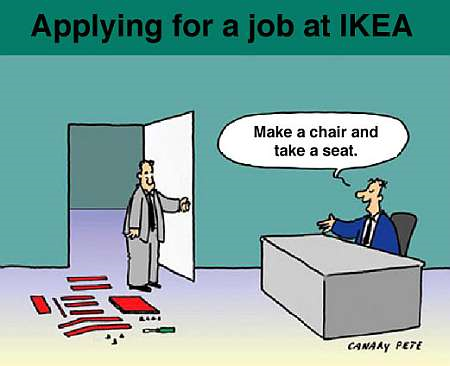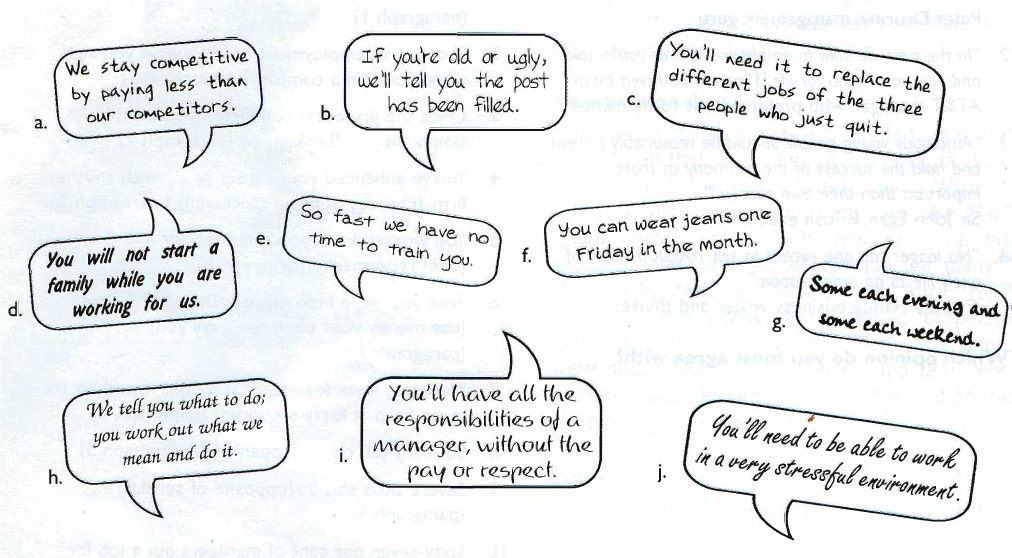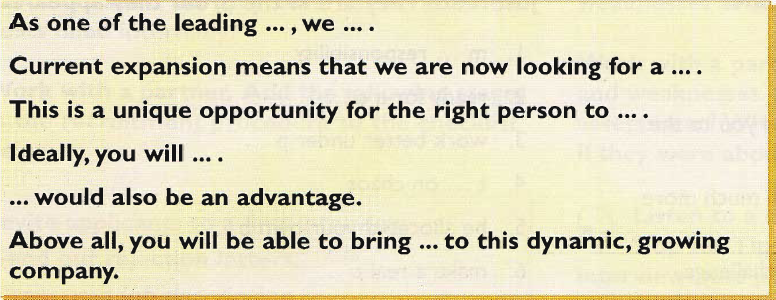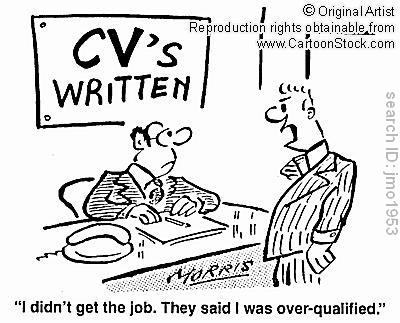Unit 4. JOB HUNTING

4.1. Listening Development
Assignment 1. Listen to the recording on jobs available for the students and answer the following questions.
- How many jobs are listed?
- Do you need experience to apply for all the jobs?
- What do you do to listen to the job listing again?
- Which job would be best for a college student?
- Which job doesn’t involve working with the public?
- Which position does the caller probably want?
Assignment 2. Listen to the recording again and write down the position requirements exactly the way they are given.
Customer service representative
Health information clerk
Entry-level graphic artist
4.2. Vocabulary Enrichment
Assignment 1. Match the following job, career, and employment terms with their definitions. Be ready to give their equivalents in Russian.
Job-Seeker's Glossary of Job-Hunting Terms
Recruiters/Headhunters Benefits Dress for Success Compensation Package Salary
USP Job Interviewing Corporate Culture Job Shadowing Cover Letter
Accomplishments Networking Job Skills Job Application Resume
Contract Employee
... – these are the achievements you have had in your career. These key points really help sell you to an employer – much more so than everyday job duties or responsibilities. In your cover letters, resumes, and job interviews, focus on key career accomplishments – especially ones that you can quantify.
... – an important part of your compensation package, and part of the salary negotiation process. Note that every employer offers a different mix of benefits. These benefits may include paid vacations, company holidays, personal days, sick leave, life insurance, medical insurance, retirement and pension plans, tuition assistance, child care, stock options, and more. Can be worth anywhere from 20 to 40 percent of your salary.
... – when a job-seeker approaches an employer (usually through an uninvited cover letter) who has not publicly announced any job openings. See hidden job market and cover letters.
... – the combination of salary and fringe benefits an employer provides for an employee. When evaluating competing job offers, a job-seeker should consider the total package and not just salary.
... – where you work for one organization (and its salary and benefit structure) that sells your services to another company on a project or time basis. Compare to freelancer.
... – the collection of beliefs, expectations, and values shared by an organization’s members and transmitted from one generation of employees to another. The culture sets norms (rules of conduct) that define acceptable behavior of employees of the organization. It’s important for job-seekers to understand the culture of an organization before accepting a job.
... – should always accompany your resume when you contact a potential employer. A good cover letter opens a window to your personality (and describes specific strengths and skills you offer the employer). It should entice the employer to read your resume.
... – first coined by the author John Malloy in the 1970s, the term Dress for Success signifies tailoring one's attire, grooming, and overall appearance toward making a great first impression in a job interview - as well as maintaining a professional look while on the job to aid career advancement. Will dressing properly get you the job? Not by itself, but it will give you a competitive edge and help you make a positive first impression.
... – where you work for yourself and bid for temporary jobs and projects with one or more employers. Freelancing is not an alternative to hard work, but many people enjoy the freedom, flexibility, and satisfaction of working for themselves.
... – one of the best types of work experiences for entry-level job-seekers because the majority of employers say experience is the most important factor in whether you’re hired. Internships involve working in your expected career field, either during a semester or over the summer. Besides gaining valuable experience, you get exposed to the business environment and gain valuable references and network contacts.
... – sometimes also called an application for employment. Many organizations require you to complete an application (either to get an interview or prior to an interview). Even though many of the questions duplicate information from your resume, it is extremely important to complete the application neatly, completely, and accurately.
... – all about making the best matches. Both the company and the job-seeker want to determine if the fit is right between them. First impressions are key (see dress for success), and preparation is critical to success.
... – one of the most popular work-based learning activities because it provides job-seekers with opportunities to gather information on a wide variety of career possibilities before deciding where they want to focus their attention. Job shadows involve brief visits to a variety of workplaces, during which time you "shadow," observe, and ask individual workers questions.
... – the skills you need to do a particular job. For example, an accountant needs to have good math and accounting skills; a doctor needs to have good medical, scientific, and personal skills.
... – means developing a broad list of contacts – people you've met through various social and business functions – and encouraging them to assist you in looking for a job. People in your network may be able to give you job leads, offer you advice and information about a particular company or industry, and introduce you to others so that you can expand your network.
... – an offer by an employer to a prospective employee that usually specifies the terms of an employment arrangement, including starting date, salary, benefits, working conditions. Also called a job offer.
... – professionals who are paid by employers to find candidates for specific positions. They often recruit candidates, but job-seekers can also approach them. Avoid any firms that require job-seekers to pay for their services.
... – a group of people who will say good things about you and who know specific strengths that you offer. Can include work references (current and past supervisors), educational references (former teachers or school administrators), and personal references (who can speak of your character). Never include references on your resume or cover letter; they should be listed on a separate references sheet. And always ask people before including them as a reference for you. Never provide a list of references unless they are requested.
... – a key job-hunting tool used to get an interview, it summarizes your accomplishments, your education, as well as your work experience, and should reflect your special mix of skills and strengths.
... – financial compensation an employee receives for performing the job, and part of your compensation package. Can be determined by hourly, daily, weekly, monthly, and yearly. Also can include overtime pay, bonuses, and commissions. See also benefits and compensation package.
... – an advertising term – unique selling proposition – that refers to the one thing about a product that makes it distinct from all others. In job-hunting, job-seekers need to find the one thing that makes you more qualified for this job than anyone else. What can you offer that no other applicant can?

Assignment 2. Complete the following extracts from job advertisements using the words in the box which fit best.

|
|
Assignment 3. Spot all the mistakes in the text below.
Assignment 4. Read between the lines! Be careful! Not all job ads are what they seem. Match the abstracts above (Assignment 2) to what they may really mean.

|
|
Assignment 5. Translate the following (consult Active Vocabulary section of this Unit):
4.3. Reading Improvement
You are going to read an extract from a newspaper article. For questions 1-7, choose the answer which you think fits best according to the text.
A lot of advice is available for college leavers heading for their first job. In this article we consider the move to a second job. We are not concerned with those looking for a second temporary position while hunting for a permanent job. Nor are we concerned with those leaving an unsatisfactory job within the first few weeks. Instead, we will be dealing with those of you taking a real step on the career ladder, choosing a job to fit in with your ambitions now that you have learnt your way around, acquired some skills and have some idea of where you want to go.
What sort of job should you look for? Much depends on your long-term aim. You need to ask yourself whether you want to specialise in a particular field, work your way up to higher levels of responsibility or out of your current employment into a broader field.
Whatever you decide, you should choose your second job very carefully. You should be aiming to stay in it for two to three years.
This job will be studied very carefully when you send your letter of application for your next job. It should show evidence of serious career planning. More important, it should extend you, develop you and give you increasing responsibility. Incidentally, if the travel bug is biting, now is the time to pack up and go. You can do temporary work for a while when you return, pick up where you left off and get the second job then. Future potential employers will be relieved to see that you have got it out of your system, and are not likely to go off again.
Juliette Davidson spent her first year after leaving St. Aldate’s College working for three solicitors. It was the perfect first job in that ‘OK… they were very supportive people. I was gently introduced to the work, learnt my way round an office and improved my word processing skills. However, there was no scope for advancement. One day I gave in my notice, bought an air ticket and travelled for a year.’
Juliette now works as a Personal Assistant to Brenda Cleverdon, the Chief Executive of Business in the community. ‘In two and a half years I have become more able and my job has really grown,’ she says. ‘Right from the beginning my boss was very keen to develop me. My job title is the same as it was when I started but the duties have changed. From mainly typing and telephone work, I have progressed to doing most of the correspondence and budgets. I also have to deal with a variety of queries, coming from chairmen of large companies to people wanting to know how to start their own business. Brenda involves me in all her work but also gives me specific projects to do and events to organise.’

4.4. Writing Enhancement
Assignment 1. Write a job description, completing the following job advertisement.

Assignment 2. Write your CV according to the formula set out below.
- Your name, home address, phone number and email address.
- Your age and marital status (married – single – divorced) and whether you have children. (No photo unless specially requested.)
- Job history, starting with your current employment, and your previous employers with dates, leaving no unexplained gaps. If this is your first application for a job, give details of your schools and university or college.
- Qualifications, academic and professional.
- Specialist knowledge.
- Hobbies and interests.
- Referees.

4.5. Speaking Reinforcement
Assignment.
Acting as an applicant: Jot down the questions you would like to ask about a job of a translator before applying.
Acting as a human resources manager: Get ready to answer questions about the job of a translator you’ve advertised in a newspaper. Put down the information on key details.
Then get ready to act out telephone conversations with your groupmates in class swapping these roles.
